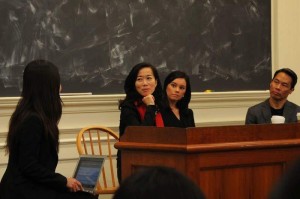“Am I abandoning my Chinese identity when I’m speaking better English every day?”
I was stunned. I hardly knew her.
She was among a group of college students standing in a semi-circle waiting to talk to me after I spoke at a panel discussion about “Being Chinese in American Media”  two years ago.
two years ago.
“What makes you think you are being un-Chinese?” I answered with a question trying to search for clues about her state of mind.
“Every time I go back to Beijing and hang out with my Chinese friends, they criticize me for losing my Chinese getting better with my English. They say I’m being un-Chinese! Too American. What should I do?”
As a 19-year-old freshman at Wellesley, an elite all women’s college widely known for grooming the next generation of women leaders with an emphasis on superb communications skills – interpersonally and professionally, I detect her talent as a quick verbal learner. She told me she’d immersed herself in an intense English-language program in an international school before coming to America. She’s determined to succeed here, but not at the risk of losing her sense of identity, which she took seriously when her friends back home needled her.
“Do you think you should do anything? Are you being un-Chinese” I asked her.
“No, not at all. But the longer I’m in America, the more I speak English in class and with friends, the easier and more natural it comes to me.”
“It” is her ability to transcend the language barrier and adapt to a drastically different culture.
“It” is her interest in interacting and communicating with American and non-Chinese friends.
“It” is her dream to be educated in America, to see and to experience a brand new world.
“It” all seems healthy to me. In fact, her approach is key to surviving and thriving in a place like Wellesley. I personally saw nothing wrong with it, but I’m not the one who needs her Beijing friends’ approval. What struck me as more remarkable is how much she fears the judgment of her peers that she was losing her Chinese identity. That begs the question – why attach one’s language ability to one’s ethnic or national identity? Who gets to decide who you are or how to express yourself at such an early stage in life?
While these thoughts were swirling in my mind, I realized I needed to point her to search the answer within herself.
“If your intention is to understand and be understood by Americans, then speaking good English is a necessary and important skill that serves you and those around you. I think you’re doing very well!”
Her quick smiles and nods prodded me to go a step further.
“Why not see English as a bridge to build relationships? Why not see relationships with Americans as a big part of your education here. Why not see English as another asset to your identity as a bi-lingual Chinese?
“Yeah, exactly. I was thinking about studying Spanish as well.” She was beaming with such radiance that I knew she’d found her true self.
She is the kind of Chinese who not only speaks good English, but also wants to learn more foreign languages and cultures. In that sense, she is very un-American and very un-Chinese, but a very modern and global-minded Chinese in America.[:zh]“Am I abandoning my Chinese identity when I’m speaking better English every day?”
I was stunned. I hardly knew her.
She was among a group of college students standing in a semi-circle waiting to talk to me after I spoke at a panel discussion about “Being Chinese in American Media” two years ago.
“What makes you think you are being un-Chinese?” I answered with a question trying to search for clues about her state of mind.
“Every time I go back to Beijing and hang out with my Chinese friends, they criticize me for losing my Chinese getting better with my English. They say I’m being un-Chinese! Too American. What should I do?”
As a 19 year-old freshman at Wellesley, an elite all women’s college widely known for grooming the next generation of women leaders with an emphasis on superb communications skills – interpersonally and professionally, I detect her talent as a quick verbal learner. She told me she’d immersed herself in an intense English-language program in an international school before coming to America. She’s determined to succeed here, but not at the risk of losing her sense of identity, which she took seriously when her friends back home needed her.
“Do you think you should do anything? Are you being un-Chinese” I asked her.
“No, not at all. But the longer I’m in America, the more I speak English in class and with friends, the easier and more natural it comes to me.”
“It” is her ability to transcend the language barrier and adapt to a drastically different culture.
“It” is her interest in interacting and communicating with American and non-Chinese friends.
“It” is her dream to be educated in America, to see and to experience a brand new world.
“It” all seems healthy to me. In fact, her approach is key to surviving and thriving in a place like Wellesley. I personally saw nothing wrong with it, but I’m not the one who needs her Beijing friends’ approval. What struck me as more remarkable is how much she fears the judgment of her peers that she was losing her Chinese identity. That begs the question – why attach one’s language ability to one’s ethnic or national identity? Who gets to decide who you are or how to express yourself at such an early stage in life?
While these thoughts were swirling in my mind, I realized I needed to point her to search the answer within herself.
“If your intention is to understand and be understood by Americans, then speaking good English is a necessary and important skill that serves you and those around you. I think you’re doing very well!”
Her quick smiles and nods prodded me to go a step further.
“Why not see English as a bridge to build relationships? Why not see relationships with Americans as a big part of her education here. Why not see English as another asset to your identity as a bi-lingual Chinese?
“Yeah, exactly. I was thinking about studying Spanish as well.” She was beaming with such radiance that I knew she’d found her true self.
She is the kind of Chinese who not only speaks good English, but also wants to learn more foreign languages and cultures. In that sense, she is very un-American and very un-Chinese, but a very modern and global-minded Chinese in America.



